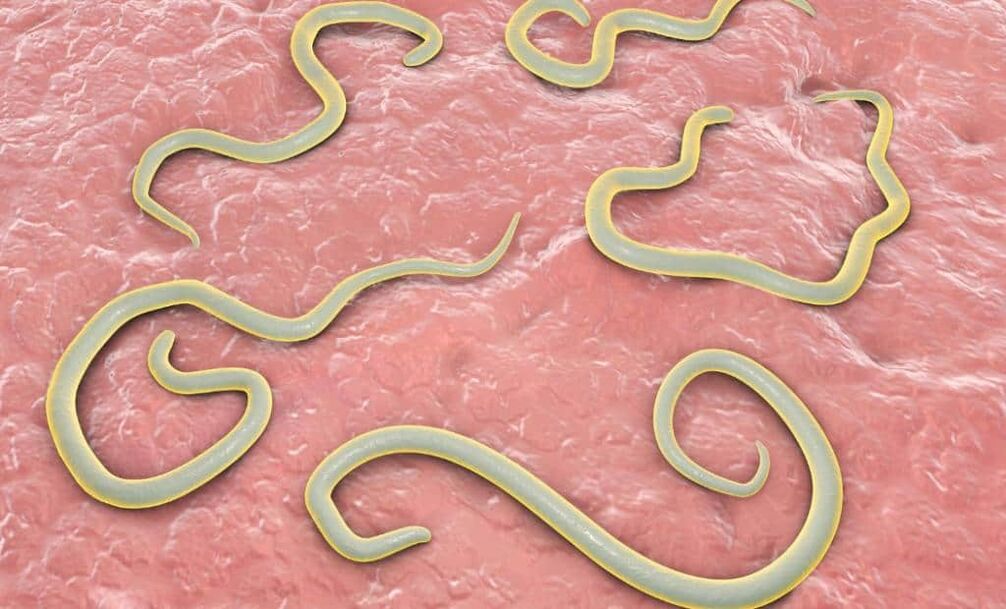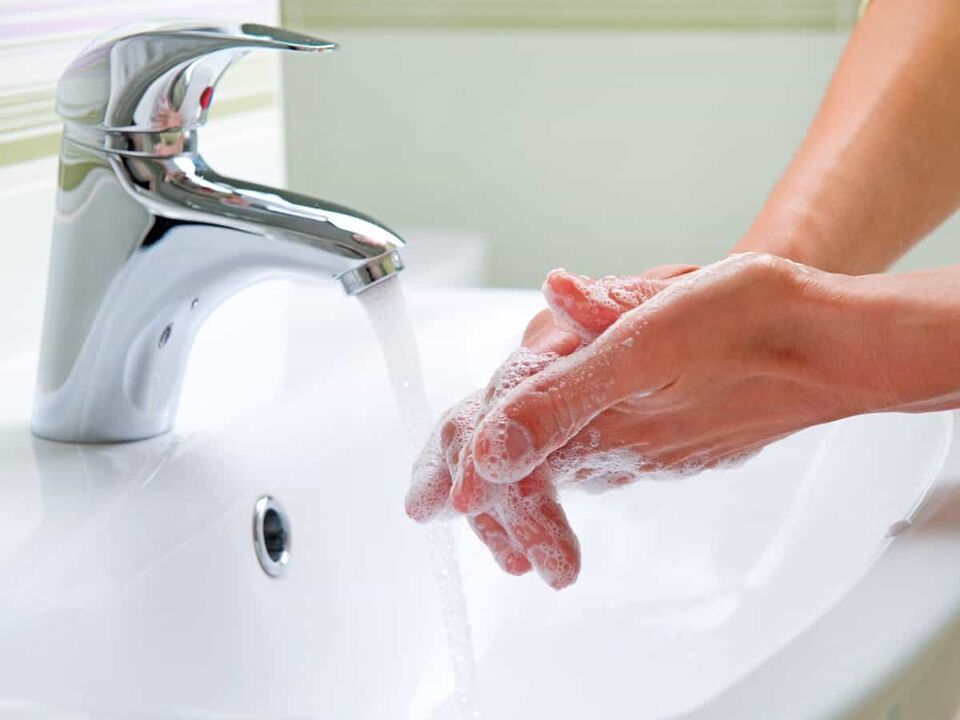Prevent wormsIt lies in observing strict hygiene rules. Many of us don't even realize that we are infected with many parasites. Fatigue, apathy, headaches and indigestion are most commonly attributed to overwork or food quality. Few people think that these symptoms may indicate a parasite infection.
The worst part is that helminthiasis is hidden and slowly damages our health. High-risk groups include children, whose bodies are usually not resistant to parasites. Therefore, it is very important to prevent worms in a natural way with the help of immunity.
Parasites and harm to the body
More than 400 types of parasitic worms can cause human infections with worms. Infections usually occur through contaminated food and water, and worms rarely invade the body through the skin.

According to the route of infection, parasites are divided into 3 groups:
- Biological worm-Through food (Echinococcus tapeworms, cattle and pork tapeworms);
- Ground Worm-Hands are contaminated with feces, household items, and sometimes water (whipworms, hookworms, roundworms);
- Contact with worms-Personal contact with an infected person and less self-infection (pinworm, dwarf tapeworm).
According to the structure of the body, parasites are divided into the following types:
- Round (nematode);
- Tape (taenia);
- Suction cup (with powerful suction cup and flat body).
Risk groups include children in pre-school institutions, agricultural workers, immunodeficiency patients, the elderly, and the elderly. Pets may also be at risk of infection.
In adults, helminthiasis is usually latent (occult), has a long course, and exhibits various clinical symptoms disguised as different pathologies. Children are characterized by an acute course and vivid symptoms, which are related to the characteristics of the immune system.
Worms use the human body as a source of food, habitat and reproduction. On the contrary, worms release the products of their life activities, which can cause systemic toxic damage to human organs and systems.
For example, hookworm larvae secrete an anticoagulant to maintain blood flow. It is estimated that Aspergillus duodenum alone causes 0. 2 ml of blood loss per day. For the loss of 5 ml of blood, 25 worms in the body are enough. But usually there are more. As a result, the infected person suffers from severe anemia.
According to a large number of studies, worm invasion leads to more frequent development of physical diseases, deterioration of chronic pathology, and negative effects on the host's body, including its immune system.
A characteristic of most helminthiases is the chronic course, which is related to the long-term presence of pathogens in the body and repeated infections. Children with helminthiasis are often accompanied by a variety of non-specific symptoms: weakness, fatigue, irritability, sleep disturbance, indigestion, growth retardation, weight gain, and decreased immunity.
Diseases caused by worms reduce work capacity and worsen the quality of life.
Anti-worm immunity
The immune system protects our health. It can protect the body from viruses, bacteria and parasites. Unfortunately, the immune system handles the latter worse. This is especially true for children. The child's defenses are not well developed, and the invasion of worms further weakens the body's resistance to infection. Therefore, the prevention of parasitic diseases in children is particularly important.

Anti-parasitic immunity is similar to antibacterial immunity. The connection between cells and body fluids is involved in the protection of worms. The first barrier of the intruder is the skin and mucous membranes. More commonly, worms enter the body through the digestive tract. The mucous membranes of the stomach and intestine contain immune cells that trigger a series of reactions to reject the parasites and remove them from the body.
The problem is that worms have their own defense mechanism, which usually allows them to easily pass the first barrier.
The immunity to worms is divided into primary and secondary. Since the first person is born, he is a genetically determined defensive factor. Secondary is formed in life after infection and produces specific antibodies against specific types of parasites.
The recently discovered TSLP (thymic stromal lymphopoietin) has aroused great interest among scientists. Due to their unique properties, cytokines play an important role in protecting the body from worms. Depending on the nature of the infection, TSLP can enhance or inhibit the defense response mediated by the two types of T lymphocytes.
The possibility of infection depends to a large extent on the health of the innate immunity and the entire immune system, and its effectiveness always varies from person to person and depends on the type of worm.
The good functioning of the immune system depends on our nutrition. If the body lacks the necessary vitamins and minerals to build immune cells, the response to infection will be weak and the battle will end in failure.
Immunity requires biologically active substances, which come with food. In the case of chronic stress or disease, vitamins and trace elements must be used to support the immune system, because the body uses all nutrients and herbs to strengthen the nervous system. And only in extreme cases do you resort to medication.
How does immunity against worms work?
Primary immunity against worms can work in a variety of ways:
- The parasite adapts to the internal environment of the host organism, grows well, develops, and reproduces. The immune response is minimal. In this case, helminthiasis is long-term and sometimes difficult. An example is the invasion of dwarf tapeworms.
- There seems to be a moderate immune response to the introduction of worms. This limits the fertility of the worm. For example, roundworms.
- The defense response is well expressed, thereby preventing the full development of the parasite. Worms will not reach sexual maturity, but may be harmful to health. The disease is short-lived or has a latent (latent) course.
- Effective primary immunity can prevent the introduction of parasites in the skin and mucous membrane stages. Therefore, worms will not invade the internal organs and will not harm health.
Secondary immunity helps the body respond faster and more effectively to repeated worm invasion. This prevents the development of worms and reduces toxic effects during the first stage of infection. The protective response is based on the presence of antibodies (immunoglobulins) against such worms in the blood.
The main link of immune defense against parasite invasion:
- The reaction of visceral tissues leads to separation (capsule formation) and destruction of worms;
- Production of Class A and Class E immunoglobulins;
- Changes in hormonal activity, especially changes in estrogen, exist in both women and men;
- Genetic factors (primary immunity against parasites).
One indicator of infection is high levels of eosinophils in the blood, which indicates an allergic reaction. The second important point is the sharp increase in the concentration of immunoglobulin E, provided that there is no food intolerance.
Important precautionary rules
Immunity responds to the introduction of parasites in different ways, but it is not always effective enough. Our task is to help the body prevent the threat of alien invasion. Preventive measures must be taken at all times, without exception.
Parents should teach their children the rules of personal hygiene from an early age to minimize the risk of infection.
The preventive measures are simple and easy to implement, while allowing you to completely (or almost completely) eliminate the danger of worm invasion. Despite this, doctors still recommend that high-risk groups use drugs for additional prevention, even if all necessary measures are taken. If an infection is suspected or a worm is detected during the diagnosis, the medication will also be taken as directed by the doctor.
Rules for the prevention of helminthiasis:
- Purchase meat and fish products at designated locations. The seller must have a quality certificate and a health certificate.
- Cook food well. Follow the rules of pickling, canning and pickling.
- Drink boiled tap water or filtered water.
- Wash vegetables and fruits with running water before use. Vegetables can be washed with soapy water first, and then with clean water. Soak the strawberries in a 1% soda solution. After the berries are thoroughly washed with running water. Vegetables that are heavily contaminated by chemical fertilizers are recommended to be soaked in a weak iodine solution (not more than 0. 3%).
- Follow personal hygiene rules. Wash your hands with soap and water after going to the toilet, working outdoors, working in the garden, and every time you come into contact with animals (including pets).
- Clean the area with disinfectant regularly, especially the bathroom and kitchen.
- Deworm your pets according to the veterinarian's schedule (usually 1-2 times a year).
- If it is ascariasis, pay special attention to the hygiene of your hands and nails, wash your children at night and in the morning, and change underwear and sheets every time. These are pre-ironed with an iron. This can prevent repeated self-infection.
- It is important to live a healthy lifestyle to strengthen and maintain your immune system. Proper nutrition, regular physical activity, correct response to stress, and rejection of bad habits will reduce the risk of infection with parasites.
- According to the plan prescribed by the doctor, chemoprophylaxis is performed 1-2 times a year.

Worm medicine is taken in pill form.This is chemoprevention, which aims to eliminate parasites that may enter the body but have no time to cause visceral reactions.
They have a deworming effectpumpkin seeds.Before eating, chop the seeds and mix in a little honey. The daily dose for adults is 300 grams, and for children it depends on age. Under 4 years old-80 grams, under 7 years old-100 grams, under 10 years old-150 grams, and under 15 years old-200 grams. After 3 hours, take a laxative.
Prevention of helminthiasis includes strengthening the immune system and complying with personal hygiene and product cooking and processing rules. By following simple rules, we can protect ourselves from worm infections. Chemoprevention once a year helps our immune system respond to foreign attacks.
Consult your doctor before taking anti-worm medicine. The expert will choose the treatment method that suits you and make recommendations on the treatment plan. Uncontrolled reception is not only useless, it can also harm your health. Don't forget this.
A good alternative to pills are herbs from worms.



























